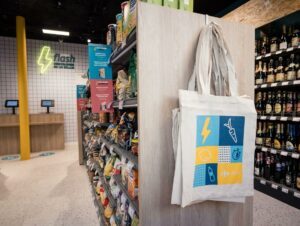When we talk about automation, we often associate it with the idea of making it easier to carry out time-consuming or repetitive tasks, in order to increase efficiency and productivity. But it's not just about saving time. The related benefits are involved in many components of retailing. According to a study by Allied Market Research, the global retail automation market is expected to reach $21 billion by 2026. Could automation then be the future of retail?
Qu'is the'automation ?
The aim of automation is to make it easier to set up processes so that they run smoothly and independently without major human action. With the help of technology such as machine learning and artificial intelligence, it is possible to carry out tasks and predict future scenarios.
The advantages and benefits of adoptingautomationtoolsin the retailsector
According to a study by Journal du net, almost 50% of retailers consider automation to be an asset in their retail strategy. Although they face growing consumer demand, not all have equal access to point-of-sale tools. But there are many advantages to automation in retail.
- Enhancing thecustomer experience
Automation in the retail sector helps to align with new shopping behaviors by improving the customer experience. A clear observation since the start of the pandemic is that consumers want shopping to be more fluid, attractive and simplified. In fact, 56% of consumers have tried out new brands and stores since the start of the pandemic (see Marketing dive study).
These changes are made possible by a strategic strategy Omnichannel and powerful new technologies. By being present at every point of contact with the customer, the retailer can better understand the customer's buying journey and then propose a more appropriate offer. It is this synergy between the various channels that ensures long-term commitment.
But automation also has the advantage of reinforcing the feeling ofbelonging to a brand by facilitating customer loyalty. The benefits are especially noticeable in CRM, as it's an opportunity to maintain privileged contact with customers.
Using these tools, the company can create more personalized communication by offering targeted promotions and newsletters. By using automation, the company can track all the activities of each potential customer. This, in turn, will help teams to better communicate and personalize each conversation to enhance the customer experience.
Innovative automation systems also make the purchasing process more fluid and pleasant.Dematerialized payment and automatic checkouts have also seen their use increase. Automation at this level gives sales staff the opportunity to spend more time in the store advising and strengthening the relationship with the customer. Thanks to these tools, queues can be reduced and the purchasing process optimized. As a result, time spent at the point of sale is reduced, and the overall customer experience is enhanced.
Focus on the connected store of tomorrow
Carrefour launched its new "Carrefour Flash" store format on Wednesday November 24 (see Business insider). "10 seconds to shop in 10 seconds" is the new challenge that the leading supermarket chain wants to take up. Following the example of Amazon GO, Carrefour is the brand that has optimized and benefited from automation in the retail sector.

- Reduce cocostscosts in logistics
Automation in retail has the advantage of replacing many manual processes. This means less human capital is needed to carry out a specific task. This time saved can then be allocated to other, more important activities.
However, with e-retailers offering delivery in less than 24 hours, companies are facing new logistical challenges. This makes process automation all the more necessary, especially in order preparation and dispatch. With e-commerce, a customer can make a purchase at any time of day. Automation enables orders to be prepared and dispatched much more quickly than if they had to wait for an employee to be present.
These tools (warehouse management software, robots, etc.) are useful for locating inventories, managing teams and creating unique workflows. These are necessary changes if companies are to exceed consumer expectations, particularly in terms of delivery times and return options.
- Guaranteeing greater precision for decision-making decisions
Tools linked to AI and Big data are useful for pulling out data on consumer behavior and better targeting them.
According to a study by Docuware, over 50% of retailers still use paper to track their processes and workflows. This increases the risk of errors, which can have significant financial consequences. Especially when it comes to making decisions based on poor data analysis. Automation can help by reducing the number of human errors, which has an impact on data accuracy.
When it comes to automating specific retail-related tasks, technology brings an extra level of precision that human beings just can't provide. These benefits have a strong impact in providing visibility in inventory tracking, analysis reports, accounting and invoicing.
Automation as part of a global strategy for all
While some stores today are looking to integrate automation-related tools, this is not a new concept. Retail automation is here to stay, and is already redefining the future of retail.
So automation isn't about cutting jobs, it's about creating better job opportunities in the sector. It empowers small retailers by giving them access to the technology they need to create good customer experiences and be competitive.
But this requires the development of an action plan and the precise definition of objectives.
--------
Sources :
- Business Insider - In this new Carrefour Flash store, you can do your shopping in record time
- Statista - Global retail automation market size from 2018 to 2019, with a forecast up to 2026
- Docuware - 3 tips for moving from paper-based processes to automated digital workflows
- Alliet Market Research - Retail automation market
- Journal du Net - Automation solutions, the key to retail success in 2021
- Marketing Dive - Coronavirus reshapes consumer habits, creating 4 new segments

